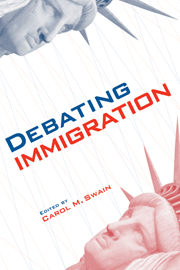Book contents
- Frontmatter
- Contents
- About the Contributors
- Preface
- Acknowledgments
- 1 Introduction
- PART I PHILOSOPHY AND RELIGION
- 2 The Disconnect between Public Attitudes and Policy Outcomes in Immigration
- 3 Carved from the Inside Out
- 4 A Biblical Perspective on Immigration Policy
- 5 The Moral Dilemma of U.S. Immigration Policy
- PART II LAW AND POLICY
- PART III ECONOMICS AND DEMOGRAPHICS
- PART IV RACE
- PART V COSMOPOLITANISM
- PART VI CONCLUSION
- Notes
- Index
4 - A Biblical Perspective on Immigration Policy
Published online by Cambridge University Press: 05 June 2012
- Frontmatter
- Contents
- About the Contributors
- Preface
- Acknowledgments
- 1 Introduction
- PART I PHILOSOPHY AND RELIGION
- 2 The Disconnect between Public Attitudes and Policy Outcomes in Immigration
- 3 Carved from the Inside Out
- 4 A Biblical Perspective on Immigration Policy
- 5 The Moral Dilemma of U.S. Immigration Policy
- PART II LAW AND POLICY
- PART III ECONOMICS AND DEMOGRAPHICS
- PART IV RACE
- PART V COSMOPOLITANISM
- PART VI CONCLUSION
- Notes
- Index
Summary
It is not surprising that policymakers in the United States, the most religious nation in the Western world, often bring their faith to the table, as do faithful people in other cultures, and as many American statesmen have done since the nation's founding era. This chapter offers an approach to some of the most important immigration policy questions currently confronting the United States from the perspective of a biblically based Christian faith. As a Christian congressional staffer working for evangelical legislators, I have thought long and hard about many of these issues and have tried as conscientiously as I can to apply what I believe are the insights and commands of the Bible and the Judeo-Christian religious tradition to the many issues surrounding our current immigration problems.
I stress from the outset that deriving policy prescriptions from the Bible and other Christian sources is difficult business. Many complex issues are involved – theological, exegetical, and pragmatic. I do not claim that my own conclusions are infallible, and I realize that other believers may honestly and conscientiously reach conclusions different from my own. But I do believe that the principles that I outline here, as distinct from their specific application, are appropriate Christian biblical principles. And, as such, I believe they are the principles that should guide all Christians in making public policy judgments, even if we do not always agree as to their application in specific cases.
- Type
- Chapter
- Information
- Debating Immigration , pp. 46 - 62Publisher: Cambridge University PressPrint publication year: 2007



